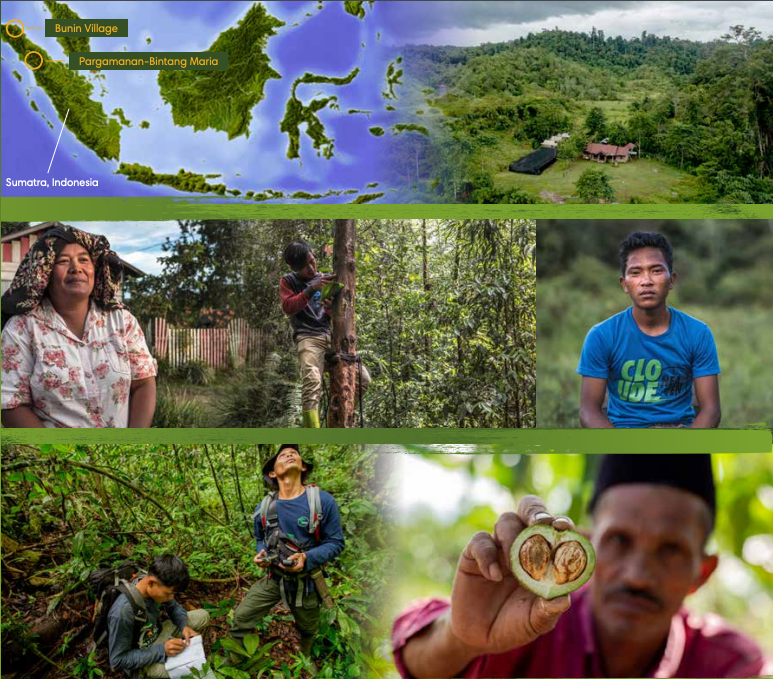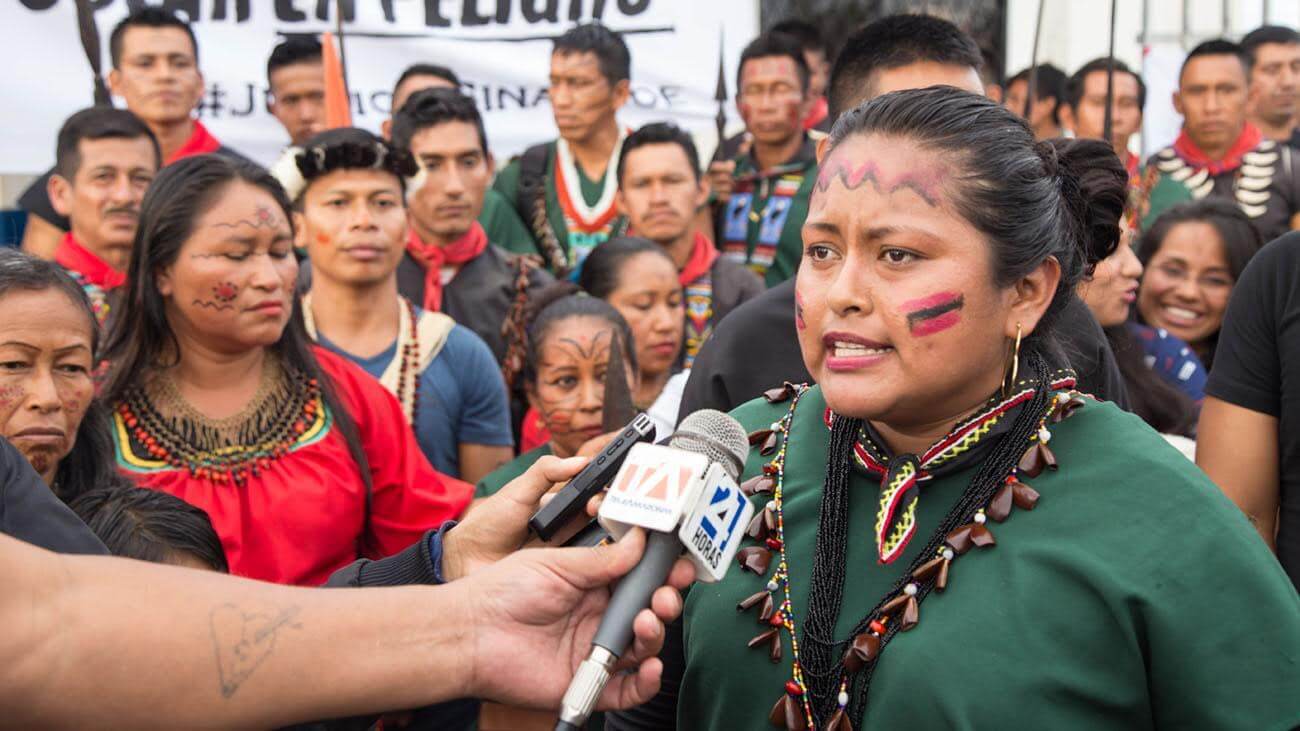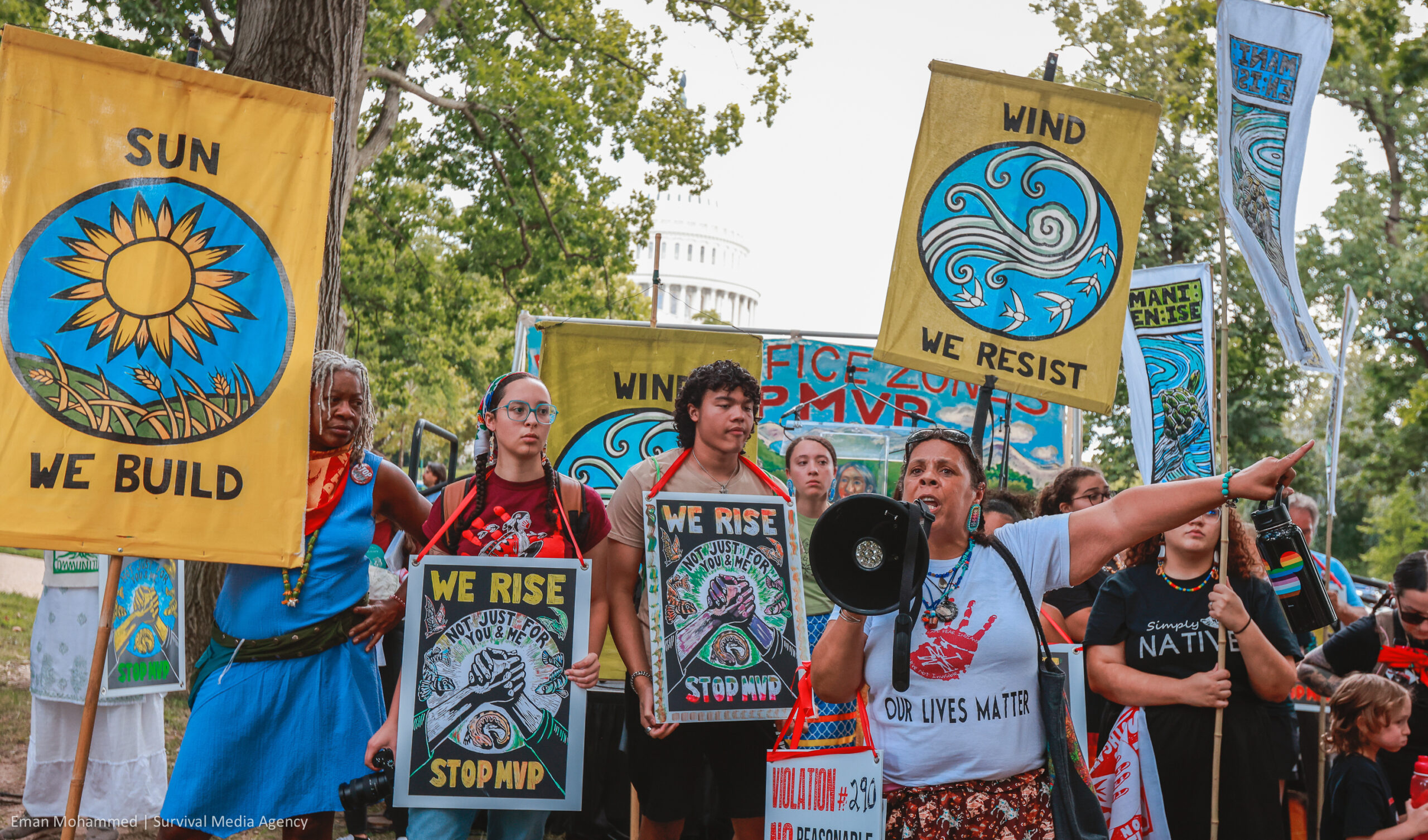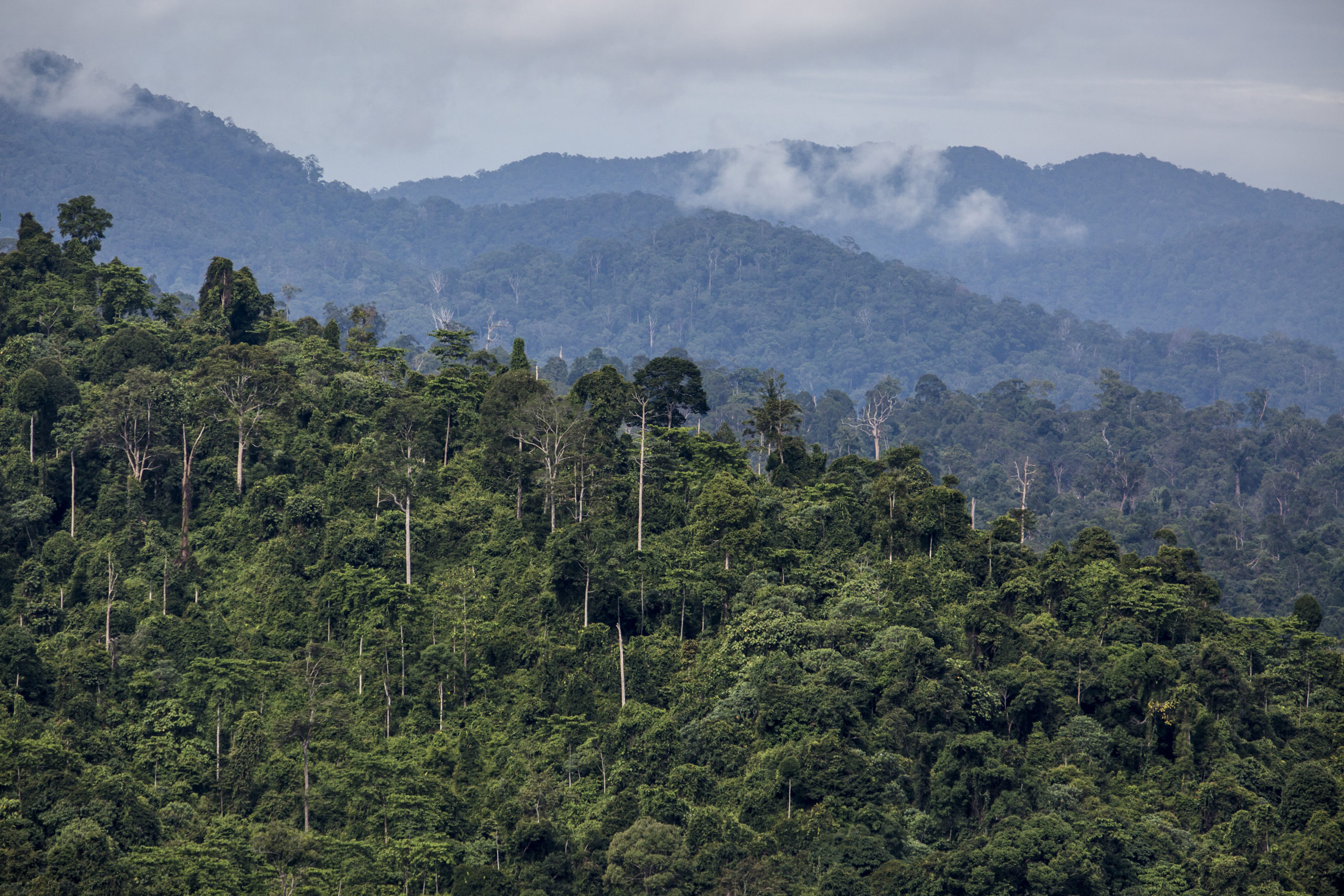The past year marked a record high in Rainforest Action Network’s (RAN) 30 years of providing Community Action Grant (CAG) funding to frontline communities and grassroots initiatives fighting to keep forests standing, protect the climate, and uphold human rights. In partnership with the Global Greengrants Fund, RAN distributed $775,000 through 87 separate grants. This brings our distributions through the CAG program over the past three decades to $6,000,000 through over 1,000 grants.
Our small grants program champions itself on its flexible, emergent grantmaking. Last year, we prioritized grantmaking in the following geographies: Indonesia, supporting communities impacted by industrial palm oil and pulp and paper plantations, as they pursued land rights strategies, capacity building, and sustainable economic alternatives; The Amazon, supporting Indigenous communities defending their traditional territories through Indigenous Guard patrolling and monitoring, women and youth leadership initiatives, Indigenous-led media, people-powered mobilizations, and legal and land rights strategies; and North America, supporting BIPOC and other impacted communities resisting fossil fuel extraction, transportation, and export. Below features some grantee highlights from priority regions:
1. Indonesia
The 2022 Forest Consent Declaration, a well-known report on the state of global forests, confirmed that the rate of deforestation in Indonesia fell by 75% in 2021 to its lowest level since local deforestation monitoring efforts began in 1990. This decrease directly correlates to the tireless efforts of frontline and Indigenous communities and the international campaigning of civil society organizations — including RAN — that for years have put pressure on the banks and brands tearing down forests in the name of profit. Partnering with and directly supporting frontline and Indigenous communities, who have lived in harmony with forests for generations, is the most effective way to keep forests standing — and RAN has been doing that for decades.
A key RAN partner in Indonesia is Kelompok Studi dan Pengembangan Prakarsa Masyarakat (KSPPM). KSPPM is supporting 23 Indigenous Tano Batak communities in the Lake Toba region in Northern Sumatra, Indonesia, impacted by Toba Pulp Lestari – a notorious company that stole their land. RAN provided $21,000 in grant funds to KSPPM in 2022. These funds were used towards mobilizations, networking, and advocacy work, field visits, documentation, as well as facilitating communications and negotiation processes with government agencies, as part of a multi-year effort to secure land rights to more than 50,000 acres for Tano Batak communities. In 2022, six of these communities took an important step and secured ‘Indigenous Forest’ title recognition by the Indonesian government. The grant funds enabled the formation of Indigenous institutions in these six communities as a necessary step in the titling process.

Members of the Pargamanan Bintang Maria community and Bunin Villageresisting land grabbing and deforestation, and map of the region. Credits: RAN Annual Report 2022.
Another key area for CAG support over the past year was the globally important Leuser Ecosystem in Sumatra, Indonesia. This ecosystem is the last place on Earth where Sumatran orangutans, elephants, tigers, rhinos, and sun bears still roam the same habitat and where palm oil plantations impact many communities. Located at the foothills of the Leuser Ecosystem, the Gayo people of the Bunin Village have fought for millennia to preserve their customary land. Recently, after years of coordinated efforts, the community achieved a long overdue legal recognition of their lands and village forests from the government of Indonesia.
Yet, even with official recognition, the community still faces threats and uncertainty from the endless demand for cheaply produced palm oil, namely from the company PT. Tegas Nusantara. For too long the profits of palm oil companies and land speculators have been prioritized ahead of the rights and well-being of the people in the Leuser Ecosystem. If PT. Tegas Nusantara, or other palm oil companies, convert these lands for palm oil profit there will not only be massive environmental damage, but the very future of Bunin Village will be in doubt. The community’s history and continued practice of traditions and cultural values could be lost forever. That is why we support the local activism and protection of the Bunin Village through CAG. This is necessary not only for Bunin people but also to secure a stable climate, protect the world’s remaining biodiversity, and support the thriving communities of millions of Indigenous Peoples.
2. The Amazon
Over the last three years, RAN provided over $1.3 million in grants to frontline and Indigenous-led organizations in the Amazon, who faced land grabbing, violence, and state-sanctioned repression for defending their ancestral lands. The Amazon Rainforest is home to 400 distinct Indigenous peoples who are its best, rightful stewards. It is the planet’s largest tropical rainforest, a stabilizer of the global climate, and contains one-third of all species on Earth. In 2022, CAG supported key Indigenous-led initiatives dedicated to protecting the lungs of the Earth and upholding the rights of its Indigenous stewards.

2022 Goldman Environmental Prize Winner, Alexandra Narvaez, elevating Indigenous land rights before Ecuador’s Constitutional Court. Credits: Amazon Frontlines
In February 2022, the Constitutional Court of Ecuador, the country’s most powerful judicial body, published a ruling recognizing, for the first time, the right of Indigenous communities to have the final decision over oil, mining, and other extractive projects that affect their lands. Ecuador now has one of the most powerful legal precedents in the world on the internationally recognized right of Indigenous peoples to Free, Prior and Informed Consent (FPIC), a powerful legal tool for Indigenous survival and the protection of huge swaths of forests and mega-biodiverse ecosystems. The ruling stems from the A’i Kofán community of Sinangoe’s 2018 lawsuit that annulled 52 gold-mining concessions granted by the government along their most important river. The decision signals that Ecuador’s highest court backs the right of all Indigenous peoples to have the final say over extractive projects that may affect over 23 million acres of Indigenous lands and forests nationwide. CAG recipients, Alex Lucitante and Alexandra Narvaez, were recognized with the prestigious Goldman Environmental Prize in 2022 for their activism leading to this legal precedent.
RAN has provided ongoing support to Organización Waorani de Pastaza (OWAP) since 2019 when the Waorani’s campaign against the Ecuadorian government’s proposed auction of their ancestral territory to the international oil industry resulted in a decision protecting 500,000 acres of Waorani ancestral land from oil auction. This case set a critical legal precedent for other Indigenous Nations impacted by the same oil auction. This last year, RAN provided two $25,000 grants contributing to the following OWAP priorities: strengthening leadership capacity through training and hands-on project management; expanding relationships with stakeholder communities through planning and visioning assemblies; strengthening Indigenous rights to FPIC through legal strategies; supporting Waorani women-led food sovereignty initiatives in ten communities; implementing intercultural education projects across twelve Waorani communities; and finalizing territorial demarcation efforts and scaling land patrolling to prevent an uptick in illegal logging and mining. The Waorani land patrol supported by OWAP is monitoring new swaths of territory and through this effort detected mining activities and demarcated their territory across 500,000 acres. In partnership with Amazon Frontlines, OWAP also built a new land patrol headquarters to serve as a meeting and first-aid space, as well as to store monitoring equipment.
In the Ecuadorian Amazon, RAN also supports the Ceibo Alliance, an Indigenous-led coalition of the Kofán, Siona, Secoya, and Waorani peoples. In 2022, RAN provided two $15,000 grants in support of Ceibo Alliance’s Women’s Leadership School, which is designed to bring Indigenous women together to foster empowerment and livelihood opportunities while bolstering economic resilience, food sovereignty, and traditional healing practices. The goal of the project is to create a new model for economic, environmental, and cultural resilience led by women in some of the Indigenous societies hit hardest by oil extraction, mining, agriculture, and Covid-19. In 2022, the school trained 20 new women participants and offered additional training and support to the 31 participants from 2021 as well as provided accompaniment for the five community-based women’s associations Ceibo has supported in their efforts to implement microenterprises in communities, over the last five years.
The Brazilian Amazon has been in a state of emergency and at a tipping point due to attacks on the rights, lives, and territories of Indigenous and forest peoples during the Bolsonaro administration in Brazil, starting in 2019. These attacks included efforts to invalidate Indigenous land claims via the Supreme Court, the purging of employees and reduction of enforcement mechanisms of the National Indigenous Peoples Foundation (FUNAI), and an attempt to allow mining on Indigenous lands, among many other things.
As a result, there have been huge increases in deforestation and human-made fires impacting the Amazon, and invasions of Indigenous lands. In response, Indigenous communities from across Brazil mobilized many times, including the 1st and 2nd Indigenous Women’s March led by Articulação Nacional das Mulheres Indígenas Guerreiras da Ancestralidade (ANMIGA) and the Acampamento Terra Livre led by Articulação dos Povos Indígenas do Brasil (APIB), which were all supported by our CAG program.
Brazil’s new president Luiz Inácio Lula da Silva was sworn-in on Sunday, January 1, 2023, bringing hope for positive change with the new administration’s early commitments to a government putting Indigenous peoples at the center, recognizing their ancestral right to decide over their lives and territories. As part of this transition, long-term Indigenous leader Sonia Guajajara was appointed as the first minister for the newly created Ministry of Indigenous Peoples. Joênia Wapichana, the first Indigenous congresswoman in the country, was appointed by Lula to be the president of FUNAI, the main government body for Indigenous affairs. Never before in Brazil’s history has an Indigenous woman presided over FUNAI or assumed a ministry.
However, there remain many challenges including a congress filled with agribusiness lobbyists and those more focused on profit from the Amazon than the value of its protection. There was an attack on January 8th, 2023 by supporters of former president Bolsonaro on government institutions in Brasília, similar to the January 6th, 2021 insurrection in Washington, D.C. by Donald Trump supporters.
With a lot happening in Brazil at the moment, there is a real need to support those who are fighting to uphold the will of the people and hold off those who would continue the nightmare of Bolsonaro’s regime. The country’s Indigenous movements identified the need to show its strength and unity alongside the historic creation of the federal Indigenous ministry and the restoration of FUNAI.
In coordination with Amazon Watch, RAN granted $10,000 to the ANMIGA-led mobilization in January 2023 in Brasilia joined by Indigenous women from all 26 states of Brazil. This gathering continued trainings and dialogues around Indigenous women-led strategies in defense of traditional territories started during the previous mobilization and provided an opportunity for other Indigenous women to meet and show solidarity with the Indigenous leaders taking on roles in the new Lula administration. ANMIGA is also organizing the 3rd Indigenous Women’s March to be held in September 2023.
3. North America
RAN provided $17,500 in 2022 to support frontline community resistance to the fracked gas Mountain Valley Pipeline. If completed, this massive fossil fuel infrastructure expansion project would lead to annual emissions equivalent to 26 coal plants and threaten communities’ land, air, and water along a 300-mile route, impacting nearly 1,000 streams and wetlands.

Frontline delegation from the Appalachian region to Washington, D.C. to resist the Mountain Valley Pipeline. Credits: Eman Mohammed, Survival Media Agency.
Our grants supported Indigenous-led community organizing, mass mobilization, and a communications effort spotlighting West Virginia Senator Manchin’s role in profiting off of dirty fossil fuels. This effort took place at a coal plant that burns 500,000 tons of coal waste per year with Manchin’s family business supplying the coal waste. The funds also supported a delegation from the Appalachian region to travel to Washington, D.C. to oppose an infrastructure bill that would have fast-tracked the Mountain Valley Pipeline and undercut basic environmental protections. Senator Manchin’s attempt to get the Mountain Valley Pipeline built in exchange for his support of the Inflation Reduction Act was stopped through grassroots resistance. This success underscores the need to sustain frontline leadership and their community engagement efforts to increase the visibility of how the pipeline would impact BIPOC, low-income communities, the environment, and the climate.
Although communities along the pipeline route have already experienced harm such as degraded drinking water, damaged farmland, and harm to Indigenous sacred sites, the project is still lacking official authorization from several agencies. With the most difficult sections of the pipeline still left to be constructed and grassroots resistance continuing, there is a real chance the pipeline won’t be completed. Now more than ever, funding vehicles like CAG are essential to funnel emergency resources to the frontlines as decision dates approach and fights heat up.
Conclusion
Science, common sense, and decades of experience demonstrate clearly that the most effective and efficient way to preserve forests and other ecosystems is to support the rights and livelihoods of the Indigenous and frontline communities who know and love their land better than anyone else. It is also undeniable that those feeling the first and worst impacts of the climate crisis are those who had the least to do with causing it. This is why the work we are able to help facilitate through the CAG program feels like some of the most important and impactful we do here at RAN. We hope you think so too, and that you may consider contributing to continue to make these small grants possible on an even larger and broader scale.
